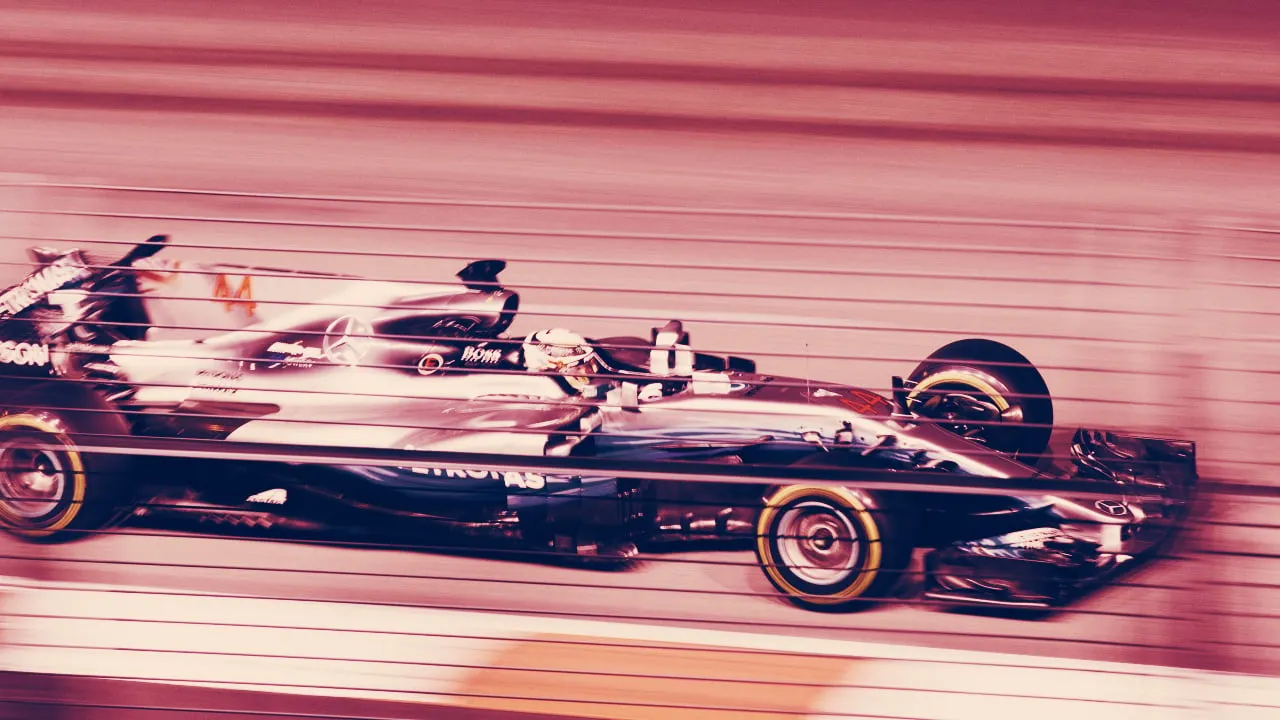The blockchain gaming race is heating up, and one Hong Kong-based multinational is angling for pole position.
Animoca Brands announced earlier this week that it’s joined forces with the “world’s most popular annual sporting series,” Formula 1. The licensing agreement grants Animoca Brands the rights to develop and publish the official blockchain game of the worldwide leader in motorsports: F1 Delta Time.
For our U.S. readers who may be unfamiliar with the racing spectacle that is Formula 1, it’s like NASCAR, but for Europeans—and basically the rest of the world. F1 enjoys a cumulative global viewership of more than 1.7 billion loyal fans across 200 countries, according to Liberty Media, the company that acquired F1 in 2016.
Formula 1 races are longer, the cars are slicker, and the drivers go much faster. And when these hot-rodders avoid spiraling through the air or erupting in a fiery inferno to reach the finish line first, they’re rewarded with a bottle of champagne—and not some dumb glass of milk—like an adult.
It’s an adrenaline-pumping good time. What could be better? Wrap it all up and put it on the blockchain!
“F1 Delta Time will be for fans of Formula 1, blockchain enthusiasts, and traditional game players,” says Yat Siu, co-founder and chairman of Animoca Brands.
How will it manage that?
NFTs, baby.
F1 Delta Time will make it possible to own your very own digital version of Niki Lauda or Mario Andretti—or, you know, whoever’s really good at driving really fast these days.
The first phase of the game, launching May 10, will feature collectible non-fungible tokens (NFTs) of F1 drivers and cars, says Siu. F1 aficionados will even be able to collect individual pieces and components of each car, such as tires and front wings, and custom helmets and suits for each driver—each item represented as an ERC-721 token.
The blockchain tech enables players to truly own their digital assets, meaning they are free to buy, trade, gift, or cash them out whenever they choose—which has historically been very difficult to do on traditional gaming platforms, outside of black markets.
The second phase of the game will come later, says Siu, and will feature traditional racing gameplay. “It will be skill-based, and require real-time input, but remain accessible to a wide audience,” he says.
The game will also incorporate an Ethereum-based, ERC-20 token as in-game currency, and Siu says the game’s multiplayer experience may also ultimately have results recorded and verified on-chain “to limit the impact of cheating or quitting mid-race.” That said, blockchain tech will still only be used sparingly when it comes to the actual gameplay: “We will avoid using blockchain at any point where it could negatively impact user experience,” Animoca Brands’ chairman confirms.
Animoca Brands is no stranger to blockchain gaming has been actively seeking out projects to widen the nascent industry’s mainstream reach. Last December, the company signed a deal with classic game maker Atari to produce a blockchain version of the smash hit mobile game RollerCoaster Tycoon—and, potentially, bring nostalgic titles of old, like Tetris and Pac-Man, over to cryptoland as well.
Siu says Animoca Brands continues to work closely with Atari and will have more to say on its development in the near future, adding that the shift to blockchain technology for the gaming industry as a whole is, in his view, inevitable.
“We see blockchain gaming as the vehicle that will bring true digital ownership to the masses. Whether that ownership is for a magic sword, a football player, or a collectible cat, what’s important is that blockchain gaming will give an unprecedented number of people genuine ownership and control of their digital assets,” he says.
This is particularly important for “freemium” games, says Siu, as true ownership, scarcity, and provenance of digital assets are likely to “drive transactions and conversion rates up,” which is what these game makers are chasing, after all.
Still, blockchain gaming is a very new industry and still “very much developing,” he says. If it doesn’t pick up the pace within the next two to three years, says Siu, then it might just “take a gaming titan to advance it.”
Start your engines.





